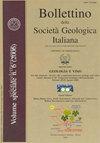Evaluation of the sources of nitrogen compounds and their influence on the biological communities in the hyporheic zone of the Sagittario River, Italy: an isotopic and biological approach
引用次数: 10
Abstract
In groundwater-dependent ecosystems (GDEs) a significant contribution of nitrogen contamination of the surface waters arises from groundwater input by shallow and deep flow systems. In general, nitrogen surface-groundwater exchanges and processes at the hyporheic scale are difficult to monitor. In order to have a better understanding about these interactions, it is proposed to use stable isotopes (15N-NO3-, 18O-NO3-, 15N-NH4+) as environmental tracers to identify the sources and fate of the nitrogen compounds in groundwater in the Sagittario River basin, central Italy. The detrimental effect of the groundwater ammonium on the meiofaunal organisms is also evaluated in the hyporheic zone, where N-NH4+ concentrations reach a maximum value of 0.6 mg L-1. The main source of the nitrogen contamination originates from agricultural and urban activities at the catchment scale. The nitrogen compounds reach the gaining stretches of the hyporheic zone along the streambed as nitrate associated to a shallow flow system and ammonium related to a deep flow system. δ15N data demonstrate that sewage and fertilizers including manure are the main sources of NO3- and NH4+, the latter being the major pollutant in the study area. δ18O-NO3- data are consistent with the nitrification of ammonium to nitrate, along with the contribution from inorganic fertilizers. Furthermore, δ15N-NO3- and δ18O-NO3- data reveal that denitrification does not play any role on nitrate attenuation in the shallow aquifer and near the discharge areas to the river. The meiofaunal communities, represented by the Crustacea Copepoda selected as the target group, were shown to be sensitive to the high concentration of ammonium found at several hyporheic sites. The statistical analyses indicated a significant reduction of species abundance in the sites polluted by N-NH4+ concentrations > 0.0653 mg L-1.意大利萨格塔里奥河潜流带氮化合物来源及其对生物群落影响的评价:同位素和生物学方法
在地下水依赖生态系统(GDEs)中,地表水氮污染的重要贡献来自浅层和深层水流系统的地下水输入。一般来说,深层尺度下的地表-地下水氮交换和过程是难以监测的。为了更好地了解这些相互作用,建议使用稳定同位素(15N-NO3-, 18O-NO3-, 15N-NH4+)作为环境示踪剂来确定意大利中部萨格里奥河流域地下水中氮化合物的来源和去向。在低渗区,N-NH4+浓度达到最大值0.6 mg L-1,也评价了地下水铵对微生物的有害影响。在流域尺度上,氮污染的主要来源是农业和城市活动。氮化合物以与浅流系统相关的硝酸盐和与深流系统相关的铵的形式沿河床到达深流带的增益延伸。δ15N数据表明,污水和肥料(包括粪肥)是NO3-和NH4+的主要来源,NH4+是研究区主要污染物。δ18O-NO3-数据与铵态氮的硝化作用一致,也与无机肥料的硝化作用一致。此外,δ15N-NO3-和δ18O-NO3-数据显示,反硝化作用对浅层和近河道的硝酸盐衰减没有任何作用。以桡足甲壳类为代表的小动物群落对几个低渗点的高浓度铵非常敏感。统计分析表明,N-NH4+浓度> 0.0653 mg L-1污染的样地物种丰度显著降低。
本文章由计算机程序翻译,如有差异,请以英文原文为准。
求助全文
约1分钟内获得全文
求助全文

 求助内容:
求助内容: 应助结果提醒方式:
应助结果提醒方式:


